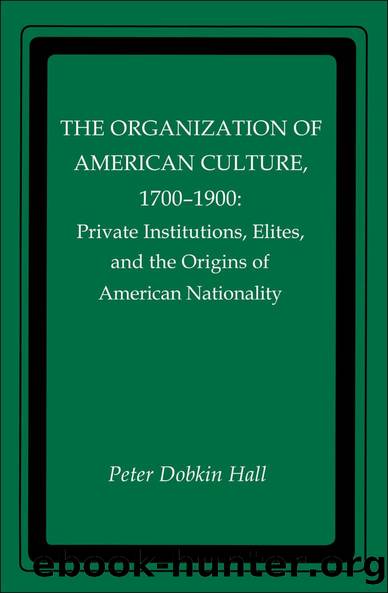The Organization of American Culture, 1700-1900 by Peter D. Hall

Author:Peter D. Hall [Hall, Peter D.]
Language: eng
Format: epub
Tags: History, United States, General, Americas (North; Central; South; West Indies), Social Science, Anthropology, Cultural & Social, Customs & Traditions
ISBN: 9780814734254
Google: hZ_NhAa-ZVoC
Publisher: NYU Press
Published: 1984-02-15T03:33:16+00:00
CHAPTER NINE
Class and Character in Boston: A Pattern of Regional Integration
As the conditions of men constituting the nation become more and more equal, the demand for manufactured commodities becomes more general and extensive, and the cheapness that places these objects within the reach of slender fortunes becomes a great element of success. Hence there are every day more men of great opulence who devote their wealth and knowledge to manufactures and who seek, by opening large establishments and by strict division of labor, to meet fresh demands which are made on all sides. Thus, in proportion as the mass of the nation turns to democracy, that particular class which is engaged in manufactures becomes more aristocratic. Men grow more alike in one, more different in the other; and inequality increases in the less numerous class in the same ratio in which it decreases in the community.
But this kind of aristocracy by no means resembles those kinds which preceded it. It will be observed at once that, as it applies exclusively to manufactures and to some manufacturing callings, it is a monsterious exception in the general aspect of society. The small aristocratic societies that are formed by some manufacturers in the midst of the immense democracy of our age contain, like the great aristocratic societies of former ages, some men who are very opulent and a multitude who are wretchedly poor. The poor have few means of escaping from their condition and becoming rich, but the rich are constantly becoming poor, or they give up business when they have realized a fortune. Thus the elements of which the class of the poor is composed are fixed, but the elements of which the class of the rich is composed are not so. To tell the truth, the class of rich men does not exist; for these rich individuals have no feelings or purposes, no traditions or hopes, in common; there are individuals, therefore, but no definite class.1
⦠the millioncracy, considered in a large way, is not at all an affair of persons and families, but a perpetual fact of money with a variable human element â¦. this trivial and fugitive fact of wealth does not create a permanent class unless some special means are taken to arrest the process of disintegration in the third generation.2
If the net cast by Yale and the other institutions of the evangelical united front over the nation was a broad and loose one, which caught many sorts of men in many different ways, the net cast by Boston lay in a smaller sea and was woven of a finer, more discriminating mesh. If Yale and the other evangelicals were concerned about redeeming the nation, Bostonians were, on the whole, concerned only with perpetuating their preeminent position in the affairs of Boston and its environs. Although the merchantsâ economic interests grew steadily more wide-ranging as Boston capital became the basis for the China trade, the exploitation of Pennsylvania iron and Michigan copper, and the construction of the western
Download
This site does not store any files on its server. We only index and link to content provided by other sites. Please contact the content providers to delete copyright contents if any and email us, we'll remove relevant links or contents immediately.
Cecilia; Or, Memoirs of an Heiress — Volume 1 by Fanny Burney(31333)
Cecilia; Or, Memoirs of an Heiress — Volume 3 by Fanny Burney(30934)
Cecilia; Or, Memoirs of an Heiress — Volume 2 by Fanny Burney(30889)
The Great Music City by Andrea Baker(21318)
We're Going to Need More Wine by Gabrielle Union(18074)
Bombshells: Glamour Girls of a Lifetime by Sullivan Steve(13109)
Pimp by Iceberg Slim(12933)
All the Missing Girls by Megan Miranda(12753)
Fifty Shades Freed by E L James(12451)
Norse Mythology by Gaiman Neil(11885)
Talking to Strangers by Malcolm Gladwell(11880)
Crazy Rich Asians by Kevin Kwan(8351)
Mindhunter: Inside the FBI's Elite Serial Crime Unit by John E. Douglas & Mark Olshaker(7835)
The Lost Art of Listening by Michael P. Nichols(6474)
Enlightenment Now: The Case for Reason, Science, Humanism, and Progress by Steven Pinker(6407)
Bad Blood by John Carreyrou(5770)
The Four Agreements by Don Miguel Ruiz(5511)
Weapons of Math Destruction by Cathy O'Neil(5038)
We Need to Talk by Celeste Headlee(4871)
